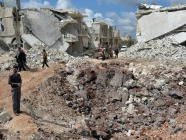
APN is deeply concerned over the spiraling calamity in Syria. More than two years of fighting has left the country in ruins and more than 100,000 people dead, including, in the latest phase, hundreds killed in a chemical weapons attack.

APN is deeply concerned over the spiraling calamity in Syria. More than two years of fighting has left the country in ruins and more than 100,000 people dead, including, in the latest phase, hundreds killed in a chemical weapons attack.

The 2013 Israel Study Tour is sold out.
If you would like to be placed on the mailing list for the 2014 Israel study tour please contact Ori Nir at 202-408-9898 or at israeltour@peacenow.org
Americans for Peace Now is organizing a small group study tour to Israel. Participants will explore the "real" Israel -- the one behind the headlines, which tourists typically don't see. More
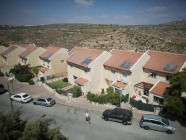
Since the birth of the peace process, popular wisdom has held that an Israeli leader cannot be expected to expend much domestic political capital during talks, because political capital must be saved to "sell" any agreement at the end of talks. In principle, there is some logic in this argument. In practice, that logic is now hitting a brick wall. If recent events indicate the patterns of action to come, talks will be in danger of falling apart long before an agreement is in reach.

When Israel's Maariv daily wrote about housing construction in East Jerusalem this summer, it offered exact numbers - down to the individual house.

By Rob Eshman
Last Monday night after dinner, after the dishes were cleared, I sat in my dining room with Mark Rosenblum and asked him the question I'd long been meaning to ask: Why don't you just give up?

The chemical warfare attack in Syria is discussed in depth, including the ramifications and calculations for the U.S. and Israel.
 "On the eve of this New Year, the choice is clear: a two-state solution, or Israel's future handed over to fanatics, whose behavior in the name of what is "holy" is an abomination."
"On the eve of this New Year, the choice is clear: a two-state solution, or Israel's future handed over to fanatics, whose behavior in the name of what is "holy" is an abomination."
Rabbi Alana Suskin is the Director of Strategic Communications at Americans for Peace Now.
The following article by APN intern Aseel Saied was published in the Northern California J Weekly on Thursday, August 15, 2013
Stuck for an hour in the elevator on my way to my last day of interning with Americans for Peace Now, I found myself explaining to the young lady who was stuck with me, and who recognized my Palestinian-flag lapel pin, why a Palestinian student would choose to work at a pro-Israel organization in Washington.
I have to say, when I started my internship here this summer -- part of a joint internship project that APN and the American Task Force on Palestine (ATFP) have run for the past four years -- I asked myself the same question.
 Peace Now's series "Peace at the Bar" has been drawing much public and media attention. The event on Monday, August 19 featured Member of Knesset Ofer Selah. Ha'aretz: "In peace deal, East Jerusalem would be Palestinian capital"
Peace Now's series "Peace at the Bar" has been drawing much public and media attention. The event on Monday, August 19 featured Member of Knesset Ofer Selah. Ha'aretz: "In peace deal, East Jerusalem would be Palestinian capital"
Like much of the world, all of us at APN are watching the situation in Egypt with shock, horror, sadness - as well as with serious concern for what the future holds, both for that country and its people, and for the broader region, including Egypt's neighbor, Israel.

Q. Was last Wednesday's violent suppression of Egyptian Muslim Brotherhood demonstrations by the army a strategic turning point for the revolution in Egypt? What does this mean for Israel?
Q. Israeli-PLO final status negotiations resumed last week, also on Wednesday. How does the Israeli negotiating team of Livni and Molcho shape up?
 Yesterday, the LA Jewish Journal published an essential article by Lara Friedman. In this blunt, to-the-point piece, Lara argues that "the stakes today are too high to give in to self-indulgent cynicism and self-protective defeatism" regarding Israeli-Palestinian peace efforts. While there are reasons to be skeptical about new Israeli-Palestinian peace talks, she says, there are also concrete reasons to believe these talks can succeed.
Yesterday, the LA Jewish Journal published an essential article by Lara Friedman. In this blunt, to-the-point piece, Lara argues that "the stakes today are too high to give in to self-indulgent cynicism and self-protective defeatism" regarding Israeli-Palestinian peace efforts. While there are reasons to be skeptical about new Israeli-Palestinian peace talks, she says, there are also concrete reasons to believe these talks can succeed.

Israeli and Palestinian negotiators are preparing to resume their peace talks Wednesday in Jerusalem. Complex issues lie before them, according to Lara Friedman Director of Policy and Government Relations for Americans for Peace Now. She spoke with VOA's Susan Yackee on August 14, 2013.
Listen here

Cynicism about new Israeli-Palestinian peace efforts comes in a variety of flavors.

It is impossible for any thinking person to view yesterday's release of Palestinian prisoners - and the planned release of more prisoners - with anything but very mixed feelings.
Yesterday, Israel released the first of four tranches of Palestinian prisoners. The decision to release prisoners sparked some controversy both inside and outside Israel. In this context, it seems like an opportune moment to review Israel's own freely-undertaken commitments, some never implemented, regarding the release of Palestinian prisoners.
Since the start of the new Israeli-Palestinian peace effort backed by Secretary Kerry, it feels like every day has seen news about new settlement approvals, tenders, planning, benefits, etc. In truth, it hasn't been quite every day - but close to it. The settlement floodgates have been opened, and opened wide, especially in East Jerusalem. This timeline is intended not to provide comprehensive details of each new settlement-related development, but to track these developments across time and provide links to additional resources. Also, keep in mind that new developments can be viewed on the map through APN's "Facts on the Ground" Map App.
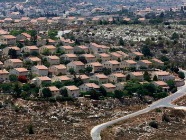
Americans for Peace Now (APN) today harshly condemned the government of Israel's recent actions to move forward with new settlement approvals and tenders in both East Jerusalem and the West Bank. APN urged President Obama and Secretary of State Kerry to engage vigorously to convince Netanyahu to roll back these reckless, destructive decisions.
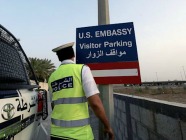
This week, Alpher discusses what was significant from an Israeli standpoint in last week's US terror alert and embassy closings, the mutual accusations of sabotaging negotiations before they begin Wednesday, an overview of the Arab revolutionary wave: where is it coming from and where is it heading, and how this is related to the fortunes of the outside powers as they intervene, not to mention what all this means for Israel.

Anyone familiar with the history of Israeli-Palestinian peacemaking can be forgiven for viewing new Israeli-Palestinian negotiations with a certain degree of skepticism, in large part fueled by concern that settlements will, once again, be used to undermine the chances for achieving peace.
By Yesh Din, written by Yossi Gurvitz
What we can learn from the IDF's farcical attempts to prevent settlers from damaging relations with the U.S.
One of the U.S.'s federal agencies is named USAID, an acronym for United States Agency for International Development. It is one of the "soft power" arms of the American government: it deals with, well, civil development around the world, trying to remind the people of the Third World that the US government possesses not just drones, but also a young people of good intentions with plenty of money. Recently, a USAID project put Israel and the US on a collision course.
Click here for more
by Matt Duss
The opening of talks between Palestinians and Israelis last week marks a small but important step toward resuming the hard work of a long-held U.S. policy goal: two states for two peoples, Palestine and Israel. Since becoming secretary of state, John Kerry has held multiple meetings with Israeli Prime Minister Benjamin Netanyahu and Palestinian Authority President Mahmoud Abbas in the effort to bring the two sides back to the negotiating table. While much work still lies ahead, Secretary Kerry's efforts underscore the importance of the two-state goal for U.S. interests in the region, as well as the urgency of the moment.
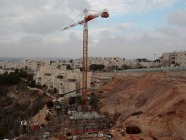
Peace Now (Shalom Achshav) has released research findings by Lior Amihai of settlement watch, showing over 1000 units being advanced despite the ongoing negotiation process. Some of these plans (approx. 300) had been removed from the previous Higher Planning committee agenda due to the press coverage (including those of Shalom Achshav) of these being brand new plans, and the pressure from the then recently announced EU guidelines.

Americans for Peace Now joins its Israeli sister organization, Shalom Achshav (Peace Now) in condemning the Israeli government's extension of subsidies to West Bank settlements by adding them to the "National Priority" list.
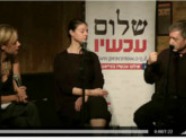
Peace on the Bar, Shalom Achshav's new program, was launched last night at a Tel-Aviv bar that doubles as a small fringe theater. For the coming weeks, every Monday night, Peace Now will feature two speakers to explore the current window of opportunity to achieve an Israeli-Palestinian peace agreement. Yesterday's guests were Knesset Member Merav Michaeli of Labor and Yossi Beilin, the Cabinet minister and Knesset member. Click here for some snippets from the event (Hebrew only).

Alpher discusses new benefits for settlers from the Netanyahu government, proposals for a referendum on withdrawal from territory and the raising of the Knesset election threshold, and whether the EU sanctions against Israeli settlements may have been timed to support Secretary of State Kerry's efforts.
(This is Part 2 of an unprecedented two-part Round-Up. Please see Part 1 for bills/resolutions/letters and coverage of HR 850, the Jerusalem passport case, CUFI on the Hill, Middle East issues in the Defense Approps process, Members on the Record, and Hearings/briefings).
1. Senate FY14 ForOps Process Gets Underway
2. More On House FY14 ForOps (Report Language)
There is so much to report from the past two weeks that it doesn't fit into a single Round-Up. Please look for Part 2 of this week's Round-Up for coverage House and Senate FY14 ForOps bills. Also, please note that Congress will be in recess for the rest of the month (yippee!) so the Round-Up will be in recess, too. Happy August!
1. Bills, Resolutions & Letters
2. House Passes Sweeping New Iran Sanctions Bill (HR 850)
3. Appeals Rules Jerusalem Passport Law as Unconstitutional
4. FY14 DOD Approps: Israel, Egypt, Syria Elements
5. CUFI on the Hill
6. Members on the Record
7. Hearings/Briefings
Briefly noted:
Americans for Peace Now's Israeli-Palestinian Peace Talks resource page (updated regularly)
Congressional Research Service Report: Iran Sanctions (7/26/13)
Congressional Research Service Report Egypt: Background and U.S. Relations (7/19/13)
What has been derided as a quixotic quest is actually a shrewd bet
By Alan Berger
If you wanted to wager at a London betting shop on success for the Israeli-Palestinian negotiations that Secretary of State John Kerry convened this week in Washington, you would be entitled to very long odds . . . about the same as a punter might have gotten betting that the new heir to the British throne would be named Billy Bob or Sydney. Nevertheless, Kerry's diplomatic gamble is worth taking, and there are reality-based reasons to suspect that the conventional wisdom -- with it's a priori assumption that the coming Mideast peace talks can produce only a catastrophic failure -- will turn out to be wrong.